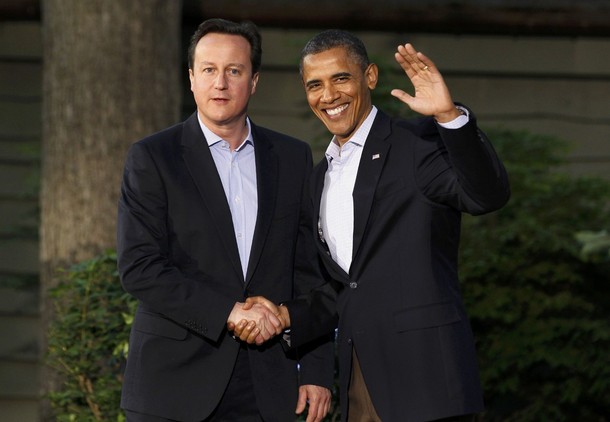
Two hundred years ago today US President James Madison declared war on the British Empire and the War of 1812 began. The war can be thus summarized; the British became ever so slightly miffed at repeated American attempts to interfere in British Canada, especially as London was in the process of casting a certain vertically-challenged Corsican into history and eventually packing him off to see out his days on ‘one of our islands’ in the South Atlantic.
As a way of drawing London’s irritation to American attention the Royal Navy began to put what the Americans called a navy in its place. Eventually, the British had to burn down the White House, making them ever so popular in the Mid-West, to teach the Americans a lesson about strategic etiquette and London and Washington lived happily ever after. The Anglosphere was thus born. And, apart from the odd bit of tiresome American behavior, the Anglosphere has not only survived but flourished with the American and British empires now united in common purpose.
What of the Anglosphere today? Nominally, it is comprised of America, Australia, Britain and Canada, with a few hangers-on such as New Zealand and could in time extend informally to the likes of India and South Africa and maybe a few others. In other words it comprises the remnants of a new long dead empire. Is it really a political and strategic option for the states concerned?
The Americans are not the power they were and will need like-minded allies in the twenty-first century as their power and influence begins to wane. The British, who had their last superpower day on 6 June, 1944, are led by people who by and large do not believe in Britain or its people and who have done very nicely thank you very much out of the EU gravy train whilst handing over much of Britain’s national sovereignty to it for little in return. However, in as much as the strategically-illiterate and inept Westminster Village ‘thinks’ big about anything these days, even they might be just beginning to realise that Athens has more influence over ‘Europe’ than London. Tying Britain’s future to a Euro-infected EU over which it has no influence whatsoever is thus the political equivalent of escaping the doomed Titanic in a lifeboat and then deciding that the safest and only course of action is to tie said lifeboat to the sinking wreck. Australia, and the other Asia-Pacific ‘members’, is only attracted to the Anglosphere as a form of insurance policy against a potentially strategically volatile China. Canada? Well, look at a map.
Equally, no-one should be under any illusions how difficult it would be to make the Anglosphere work. The Americans would see it only as a grouping that could add some political legitimacy and minor military capability to ease their strategic over-stretch as they ‘pivot’ towards Asia-Pacific. If NATO is not politically and militarily reinvested continental Europe will be effectively lost to the Americans as a meaningful group of political and military allies. The British who are calling for it tend to come from the ‘anything but Brussels’ wing of the Conservative Party. Swapping dependence on an illiberal, undemocratic bureaucracy in Brussels for dependence on a dangerously dysfunctional Washington prompts one to suggest beware what you wish for. Australia simply wants reassurance that the future in Asia-Pacific will not be exclusively Chinese. Canada? Well, look at a map.
For all that the Anglosphere may slowly and informally emerge as a forum of strategic influence much like, albeit more effective than, the Shanghai Cooperation Organisation (SCO) which is fast becoming the home of the strategic anti-West. Indeed, as power becomes more instable in the world it is also becoming more informal.
The advantage of the Anglosphere over the SCO is that its foundation would be the shared economic and financial model which constitutes the real Special Relationship and, of course, a similar world and cultural view. However, it would probably never amount to more than that.
On June 18, 1815 the Duke of Wellington gave the ever tiresome and uppity French a sound thrashing in a field just off the main E19 Brussels-Mons highway in what regrettably later became Belgium. Wellington’s victory confirmed Britain as the world’s superpower for a century. Paradoxically, the Americans also confirmed Britain’s supremacy. In 1823 the US announced the Monroe Doctrine which stated that any further European attempts to colonize North or South America would be seen as act of aggression. On the face of it Washington’s move seemed a distinctly anti-British move. In fact, it protected Britain’s strategic flank to the west and enabled the British to look south and east with confidence and thus the second British Empire was born.
As for the Anglosphere the first step would be for Her Majesty the Queen to offer the Americans membership of the Commonwealth…if they can learn to behave. If not we British could always burn the White House down again. Just look at a map.
Julian Lindley-French is Eisenhower Professor of Defence Strategy at the Netherlands Defence Academy, Fellow of Respublica in London, Associate Fellow of the Austrian Institute for European and Security Studies and a member of the Strategic Advisory Group of the Atlantic Council. He is also a member of the Academic Advisory Board of the NATO Defence College in Rome. This essay first appeared on his personal blog, Lindley-French’s Blog Blast. Photo Credit: Reuters
Image: obama%20and%20cameron.jpg
